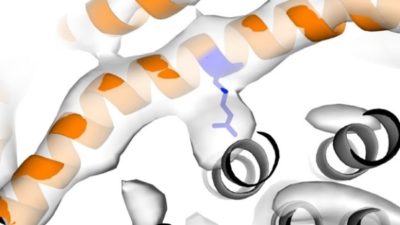2310310 GEN BIOCHEM

| Course Number | 2310310 | |
|---|---|---|
| Course Credits | 3 (3-0-6) | |
| Course Abbrviation | GEN BIOCHEM | |
| Course Title (TH) | ชีวเคมีทั่วไป | |
| Course Title (EN) | GENERAL BIOCHEMISTRY | |
| Responsible Unit | Faculty of Science, Department of Biochemistry | |
| Type of Course | International Course | |
| Semester | Intl 1st semester | |
| Academic Year | 2024 | |
| Course Coordinator | ||
| Measurement Method | ||
| Type of Course | Semester Course | |
| Course Condition | PRER 2302112 or Consent of Faculty | |
| Course Status | ||
| Instructors / staffs | ||
| Enrollment conditions | None | |
| Degree level | Bachelor | |
| Related curricular | Bachelor of Science in Biotechnology (2562) | |
| Bachelor of Science in Biotechnology (2567) | ||
| Course description (TH) | ชีวเคมีเบื้องต้น เทคนิคพื้นฐานที่ใช้ในการศึกษาด้านชีวเคมี สมบัติทางเคมีและทางชีวภาพของชีวโมเลกุล การทํางานและจลนพลศาสตร์ของเอนไซม์ เมแทบอลิซึมของชีวโมเลกุลโดยเน้นกระบวนการเกิดพลังงานและโรคที่เกิดจากความบกพร่องของเมแทบอลิซึม กระบวนการสังเคราะห์กรดนิวคลีอิกและโปรตีน กระบวนการควบคุมเมแทบอลิซึม พันธุวิศวกรรมพื้นฐานและการประยุกต์ | |
| Course description (EN) | Basic techniques used in biochemical studies; chemical and biological properties of biomolecules; functions and kinetics of enzymes; metabolism of biomolecules with emphasis on energy-yielding processes and metabolic diseases; biosynthesis of nucleic acids and proteins; metabolic regulation; basic genetic engineering and its application. |
|
| Curriculum mapping | CU-1.1: Behavioral Objectives Possessing well-rounded knowledge | |
| / | CU-1.2: Possessing in-depth knowledge | |
| CU-2.1: Being moral and ethical | ||
| CU-2.2: Having an awareness of etiquette | ||
| / | CU-3.1: Being able to think critically | |
| CU-3.2: Being able to think creatively | ||
| CU-3.3: Having skills in problem solving | ||
| / | CU-4.1: Having professional skills | |
| CU-4.2: Having communication skills | ||
| CU-4.3: Having skills in information technology | ||
| CU-4.4: Having mathematical and statistical skills | ||
| CU-4.5: Having management skills | ||
| CU-5.1: Having an inquiring mind | ||
| CU-5.2: Knowing how to learn | ||
| CU-5.3: Having leadership qualities | ||
| CU-5.4: Maintaining well-being | ||
| CU-5.5: Being community-minded and possessing social responsibility | ||
| CU-5.6: Sustaining Thainess in a globalized world | ||
| / | subPLO1.1 Explain biotechnology knowledge in practice. | |
| / | subPLO1.2 Analyze biotechnology knowledge in practice. | |
| subPLO1.3 Apply biotechnology knowledge in practice. | ||
| / | PLO2 Employ biotechnology-related technology and scientific tools. | |
| PLO3 Communicate effectively in English within the Biotechnology field | ||
| PLO4 Demonstrate behavior that aligns with ethical principles, moral values, and professional ethics. | ||
| PLO5 Demonstrate social responsibility, courage, and creativity. | ||
| Course learning outcome (CLO) | 1. | |
| 2. | ||
| 3. | ||
| 4. |
| # | Date | Time | Learning content | Instructor | CLO | Remark |
|---|---|---|---|---|---|---|
| 1 | Foundtions of Biochemistry | • | ||||
| Foundtions of Biochemistry | • | |||||
| Carbohydrates | ||||||
| 2 | Carbohydrates | |||||
| Nucleotides and nucleic acids | ||||||
| Nucleotides and nucleic acids | ||||||
| 3 | Nucleotides and nucleic acids | |||||
| Lipids | ||||||
| Lipids | ||||||
| 4 | Amino acids and proteins | |||||
| Amino acids and proteins | ||||||
| Amino acids and proteins | ||||||
| 5 | Enzymes | |||||
| Enzymes | ||||||
| Enzymes | ||||||
| 6 | Enzymes | |||||
| Enzymes | ||||||
| 7 | Overview of bioenergetics and metabolism | |||||
| Overview of bioenergetics and metabolism | ||||||
| 8 | ||||||
| 9 | Carbohydrate metabolism | |||||
| Carbohydrate metabolism | ||||||
| Carbohydrate metabolism | ||||||
| 10 | Carbohydrate metabolism | |||||
| Lipid metabolism | ||||||
| Lipid metabolism | ||||||
| 11 | Lipid metabolism | |||||
| Metabolism of N-containing compounds | ||||||
| Metabolism of N-containing compounds | ||||||
| 12 | Integration of metabolism and metabolic regulation | |||||
| Integration of metabolism and metabolic regulation | ||||||
| Integration of metabolism and metabolic regulation | ||||||
| 13 | DNA replication | |||||
| DNA replication | ||||||
| 14 | Transcription | |||||
| Transcription | ||||||
| Translation | ||||||
| 15 | Gene regulation | |||||
| Gene regulation | ||||||
| Gene regulation | ||||||
| 16 | Genetic engineering | |||||
| Genetic engineering |
| Teaching/learning media | |||
| Communication channels / LMS | |||
| Type | Channel identifier / URL | Remarks | |
| Learning Management System (LMS) | |||
| Assessment method | Level of assessment | Related CLO | Percentage |
| Assignment | 20 % | ||
| Examination | 80 % | ||
| Grading | Grading System | Letter Grad (A-F) | |
| Grading method | Norm-referenced Grading (อิงกลุ่ม) | ||
| Minimum Passing Level (MPL) | 0 | ||
| Reading list | |||
| Type | Title | Remarks | |
| Textbook | Nelson, D. L., & Cox, M. M. (2021). Lehninger principles of biochemistry (8th ed.). W.H.Freeman. | None | |
| Textbook | Jeremy M. Berg, John L. Tymoczko, Lubert Stryer, Gregory J. Gatto, Jr. (2019). Biochemistry (9th ed.). W.H. Freeman. | None | |
| Course evaluation | Course evaluation system | myCourseVille | |
| Details of improvement from previous evaluation | – | ||
| Course quality control | Responses to complaints / petitions from students | Directly to the instructor |
